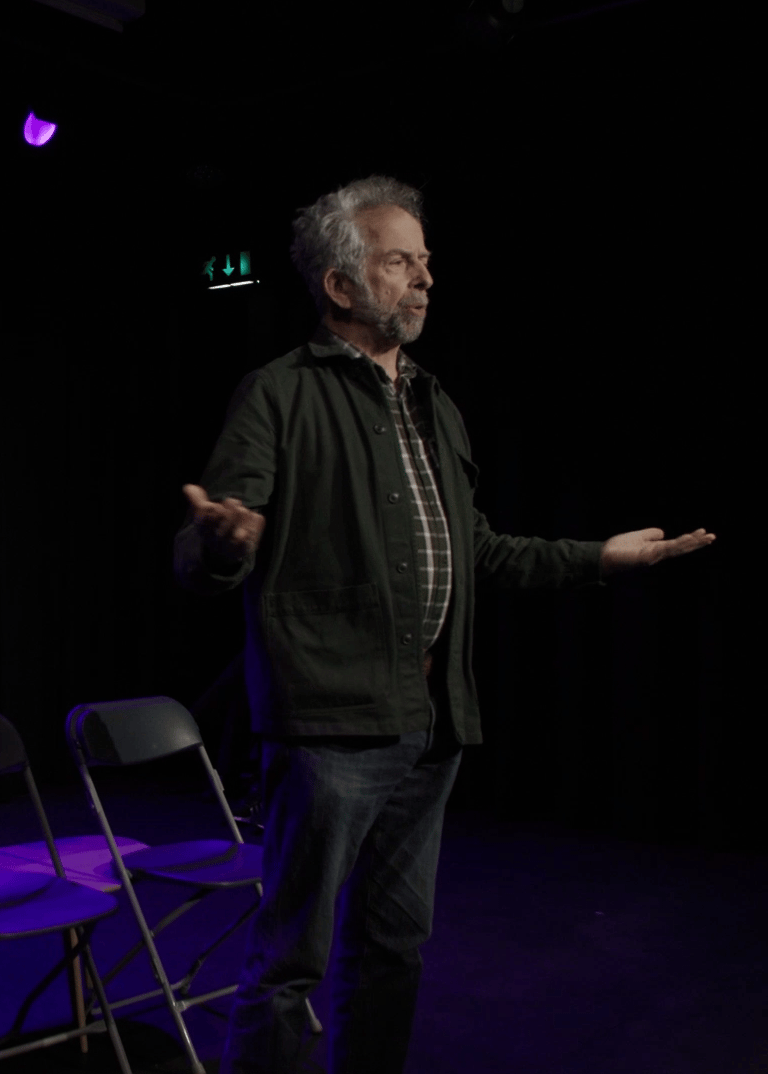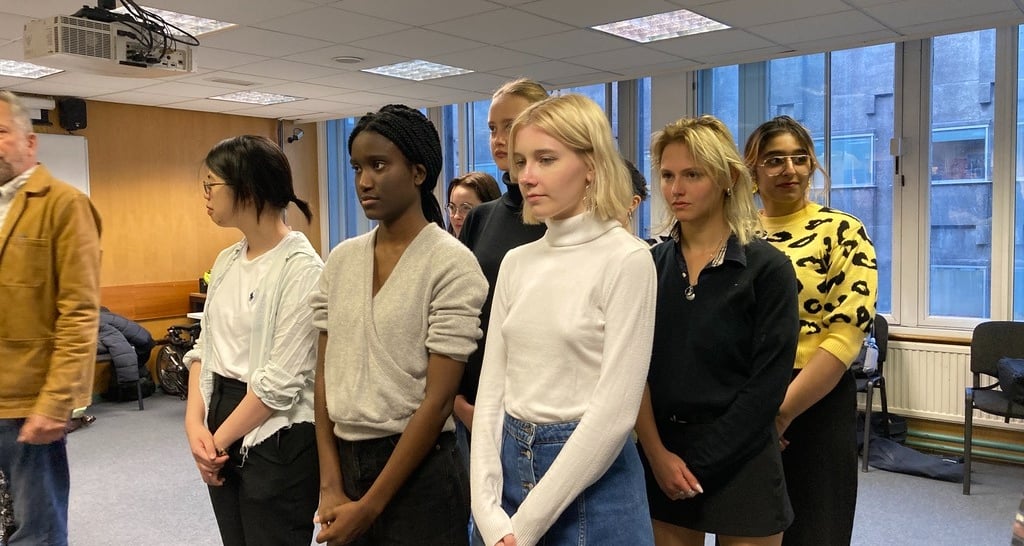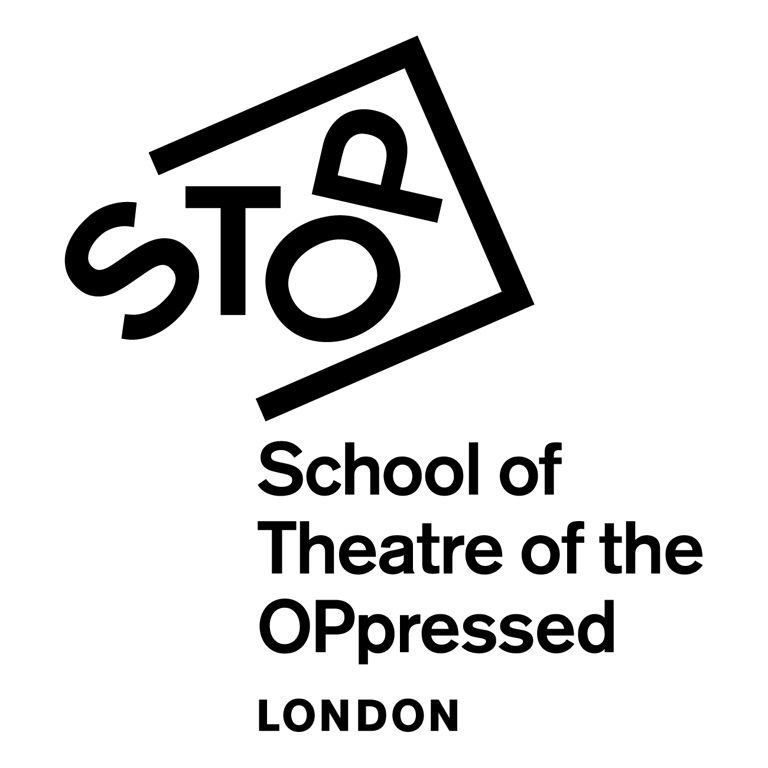Check out our new courses for 2026!
Shaping a Forum Play: Part 2
Second in the new blog series, Adrian explores what makes a 'good' forum scene, using the example of a recent commission from UCL.
Adrian Jackson
3/16/2023
In my last blog, I was writing a few thoughts about the process of devising a couple of short Forum Theatre pieces for my recent gig for University College London – if you remember, the broad issues we had been invited to look at were issues around ‘social inclusion’, diversity and bullying. Here I shall talk how we constructed a play about the first two of those headings, and the question of how to engineer a Forum theatre model – the term Boal used for the play prior to intervention – which will get audiences engaged and participating.
Any scene in which someone experiences something that looks like oppression for the character involved, at the hands of representatives of the oppressing system, can work as Forum – with the right audience. The last caveat is vital. One person’s oppression is not necessarily another’s. And all the mechanisms which work to bring out rich debate and the repeated presence of spect-actors on the stage will only happen if the play is in the right place at the right time, with the audience it needs.
I was watching recently a couple of short scenes used by an American TO company. A person of colour confronts the systematic racism of the U.S. healthcare system. It’s short, it’s straight to the point, and no reasonable person would not name what they see as anything other than a species of oppression. I have written elsewhere about the twin drivers of provocation and seduction, as the forces that persuade people to come on stage. The admixture varies – sometimes more the former, sometimes more the latter. In this case, I saw pretty pure provocation: if you were a person of colour watching one of these scenes, you would a) recognise the protagonist’s treatment and b) be pretty angry about it.
As an intervener in this forum, you might also anticipate having some fun trying your strategy on stage (seduction), but primarily, like the powerful woman in Boal’s ur-story of the birth of Forum Theatre enjoyably described in so many of his lectures, your anger would probably be enough to propel you to the stage on its own (provocation).
That kind of Forum piece, broad brushstrokes though it is, will always do the trick, with the right audience, an audience already ready to be spect-actors because the story is about them. The debate which precedes or follows the interventions is also likely to be broad brushstrokes, rough and ready. It will help generate solidarity, it will encourage the rehearsal of resistance, and it may, with clever jokering (facilitation) help us understand something about the systematic nature of oppression and how to resist it. Or it may not do the last couple of clauses, it may just free us to unload frustrations on individuals; the micro-macro nature of Forum, if not shaped carefully in the model and if not ‘jokered’ sensitively, can leave us blaming some individual characters for our oppressions, and we just go in to fight the baddies. Which can also be fun and at least somewhat therapeutic, but is unlikely to help us change the world.
When you are making a piece of Forum for a more mixed community, with various different stakeholders not all of whom agree about the nature of the oppression (or whether it is there at all), you need to make more complex models if you want to get participation; if you perform something which looks like a simplification, you risk alienating at least some of your audience – we all live complex lives and no-one wants their own life to be pastiched into a convenient cartoon. If we do that, we risk even further entrenching people in whatever views they already hold, particularly those with are antithetical to the oppressed.
Our pieces for UCL were probably in this category of requiring a fair degree of nuance. There were, we learnt, three main stakeholders, three main tribes if you like, involved in this matrix. Academics, students, and professional services. As with any group, under each of these headings obviously a HUGE range of people were covered, different-sized cogs in different sub-machines, with a wide range of views across the political spectrum. But broadly speaking, the task was to try to encompass a reasonable slice of each of these ridiculously broad categorisations, with enough nuance and complexity that they would recognise their tribe and its tribulations, without feeling reduced to caricature-like simplicity. If we recognise the characters and the situations, we will likely play the game.
I went to university in the 1970s. The whole enterprise has now expanded exponentially, into something which might now reasonably be described as an academic-industrial complex. There are huge numbers of people involved. And anecdotally, one hears that the pressures on all involved have also become much greater; student debt, mental health, social media, and sheer numbers, to name but a few. But we need to hear about these things from the horses’ mouths.
So, as previously related, we held some workshops for interested parties, aimed at these various tribes. And on the back of the workshops we set up conversations. And we set up other conversations, through normal research means (the joy of Zoom).
Whatever means you are using to gather your material, it is critical in these research processes to persuade your interlocutors to move beyond generalisations and abstractions to specifics, memories, STORIES. And we have to try to get people to be storytellers, give us the feel, the atmosphere, the context. Its not enough just to know, this guy, this academic, he treated us professional services folk terribly – this only really comes alive when we hear some of the specific phrases used (“you are only Professional Services”) and the tone in which they are spoken.
This is one of the reasons why participatory workshops work better than anything else as a research tool. Image games and exercises can quickly unlock whole fruitful reservoirs of memory and experience. Machines (the creation of a ‘machine’ made up of human bodies each with a single gesture and phrase or sound, often triggered by the other parts of the machine in place) – machines give wonderful one-line vistas of whole stories, which you can then hopefully unpack into whole scenes. And machines are the perfect analogy for systems.
And of course when a workshop process has the time to allow you to improvise scenes of people’s experiences, your need for a skilled writer or dramatist diminishes - you simply refine the story you have heard. But the modern world, the real world of commissioned projects with folk busy with their own lives, does not always allow us that luxury.
In this case, we were a team of four actors and a director, so we could gather the fascinating tidbits of scenes we encountered in a few short workshops and tease these out into fuller scenes by improvisation amongst ourselves.




Someone told a story about supporting a person experiencing mental health issues who was from a diverse background that made their life in the predominantly white-led university an even lonelier struggle. She told us how she went once to speak to a panel at another university who were uncertain whether the student she was supporting should be allowed to participate or be present at a particular event, given their knowledge of her ‘issues’. This immediately felt like a powerful forum scenes, with a built in ‘crisis’ – the moment at which there was both danger and opportunity which Boal identified as strong forum material. Perhaps it’s not a coincidence that the form of this was very courtroom like, another hardy annual for theatre makers – who does not want to offer themselves as an advocate fighting injustice in such a situation (think Twelve Angry Men!).
That story, coalesced with other stories that we heard, formed the backbone of one the two plays we made.
The choice of protagonist is as critical as anything else – again, subject matter to be more fully treated in a future blog. But, briefly, the person who is to be ‘protagonised’ for the Forum cannot be presented as a pure victim for all sorts of reasons (not least that there is probably no such thing); the protagonist must be a person who has some agency, and we must see them in the act of resistance (otherwise all sorts of victim cliches are likely to be confirmed). So in our developing story, it made sense for the student advisor to be the protagonist, rather than the person experiencing mental health issues – as the adviser has agency, has (limited) power, and is still of course experiencing oppression, albeit slightly vicarious, second-hand oppression, as she fights for the student’s rights whilst at the same time dealing with that student’s disappointment.
Another issue with playing to varied audiences is not to make a forum play ‘single issue/single intervention space’. In the Forum plays I make, I want the whole play to be territory for intervention, rather than one specified moment. So, having established the student advisor as protagonist, we are then able to bring in a host of issues which may resonate for different parts of our audience, representing the wide range of issues such a person has to deal with.
One of the people who took part in our workshops was a woman with disabilities which affected her ability to access a range of the facilities on campus. She was an enthusiastic, engaging and funny person, who really ‘got’ what we are trying to do. So it was a no-brainer to create a character partly based on her and make her another of the correspondents that our student advisor is liaising with.
And then, as the third strand of everyday oppressions affecting the university and its members, there was the issue of international students. UCL, like many other universities, has a very large contingent of Chinese students amongst others, who bring in sizeable revenue and are considered difficult to support. We heard many stories of how isolated some of these students can become, and how difficult the university seems to find it to support them. One story stood out, of a student living in halls who was told to shut up by some of his neighbours because he was crying too loudly at night. So this seemed an important topic too.
So we have our Forum, essentially. And we frame these stories in a series of encounters, as our brave protagonist Jenny grapples with these multiple issues. Phone calls seemed a true representation of the form which many of these were likely to take in real life; but phone calls aren’t always very good theatre, so we allowed our characters to break out of the phone-to-ear format after the opening exchanges, and address each other directly.
The final addition to this Forum model, and indeed a pretty useful and common addition to any semi-naturalistic model, was Jenny’s family. Friends and family are after all potential allies or further exacerbators of oppression in all our lives. So Jenny rings her Dad once and this is also a chance for her to unload the feelings which she is not able to speak openly of in her interactions with those she is trying to support.
So – we have a Forum model, enabling intervention and discussion of a range of issues affecting the university, presenting a sympathetic and relatable protagonist, into whose shoes many in an audience can feel able to step, provoked by the recognisability of the oppressions, seduced by the lightness of touch and gentle comedy with which they are portrayed.


